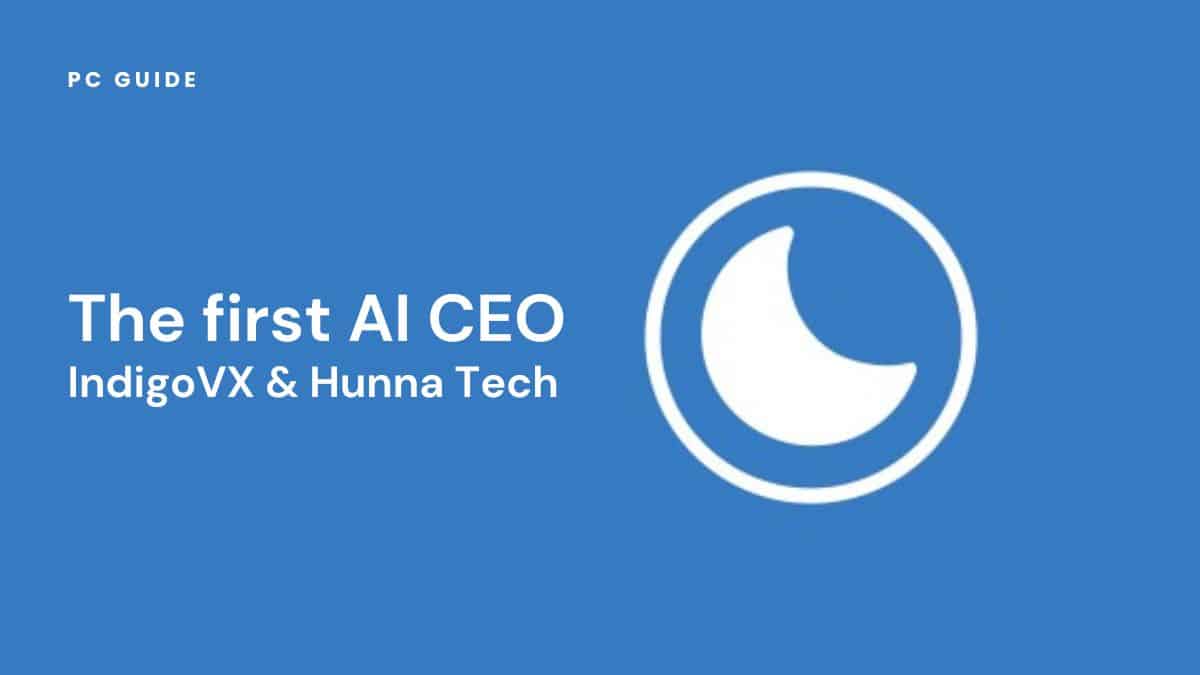The first AI CEO? – Meet IndigoVX, the final boss

Table of Contents
UK-based HealthTech start-up Hunna Technology have just made history as the world’s first AI CEO-lead company. Is this the stuff of science fiction movies, or quite literally the smartest thing an abdicating CEO can do? The public experiment has attracted attention from curious and sceptical onlookers worldwide, but will this bleeding-edge initiative pay off in the long term?
Who (or what) is the first AI CEO?
IndigoVX AI system, created by UK-based HealthTech startup Hunna Technology, is the world’s first artifically intelligent CEO (in a software sense). Europe’s first company to be lead by artifical intelligence is taking an exciting but risky gamble that the power of AI can replace human expertise at the helm – but they haven’t taken this decision lightly. Convincing investors to believe in an unprecedented gamble takes undeniable data to back it up. Data that Hunna Tech appear to have in spades. Try reading “What is ChatGPT – and what is it used for?” or “Machine learning vs Deep learning in AI” for similar topics.
Essential AI Tools
Kais Dukes, CTO, Chief Scientist, and co-founder of Hunna Technology praises their technology. “The IndigoVX AI system has consistently surpassed our expectations – it’s blown our minds. The AI CEO has successfully identified under-explored markets, optimized resource allocation, and accurately forecasted consumer trends, with an over 90% successful decision rate.”
The successes of the AI so far include:
- Defining a strong and realistic business strategy that the founders were able to execute.
- Identifying the startup idea in the first place.
- Providing key research for talks to roll out their medical AI nationally in the UAE.
- Selecting the UAE as an initial target market working with the AI every day for all business processes.
Can an AI be a CEO?
This impressive business acumen was tested over a period of 12 months to ensure consistency, safety, and legal compliance before ex-CEO Ahmed Lazem stepped down, allowing the artificial intelligence to take his place. Following his decision, he stated that he ceded his CEO title in July “because I believe an AI supervised by humans can outperform me.” A candid admission from an entrepreneur who has led multiple UAE start-ups to profitable exits.
Kais’ aptitude to lead the start-up is not to be understated either, as a mathematician with a PhD in AI leading to his work on algorithmic trading in cryptocurrency and at the London Stock Exchange. He was also, immediately prior to co-founding his own venture, the Head of Engineering at $2 billion unicorn start-up Zilch. These are the minds who trust an algorithm over their own human intelligence. If it still sounds like a crazy idea, perhaps they know something we don’t.
Steve Jobs once famously said: “It doesn’t make sense to hire smart people and then tell them what to do. We hire smart people so they can tell us what to do.” The efficient collaboration between man and machine may be what creates the next trillion-dollar company. Dr. Dejian Liu, chairman of NetDragon, said in a press release, “We believe AI is the future of corporate management. The AI, of course, is still under constant human supervision. This hybrid system, a combination of AI and humanity holds immense promise for promoting rational decision-making while maintaing what we all consider a ‘human touch’. The future of corporate management may look very different as a result.
What does Hunna Tech actually do?
Hunna Technology's main product is a medical AI called Mona, which uses a home urine test for early detection of health conditions. IndigoVX itself played a role in the design of Mona, which operates under the supervision of doctors.
How do you make an AI CEO?
So what happens with regards to company documents where, until now, you’d see the name of your companies Chief Executive Officer? AI does not have a reputation to protect, at least not in the way we consider our own careers. It cannot be held accountable for the safety of its employees, and it cannot own shares (the latter of which I’m sure is fine by co-founder Ahmed Lazem). The LinkedIn page for Hunna Tech distinctly does not list a CEO. So I guess we have our precedent for this strange and emergent question.
What’s the goal?
Hunna’s mission is not to be in news papers for letting a robot call the shots. It is still focused on producing medical AI which saves lives. I have personally worked for a medical AI startup and I can attest to the high spirits of being at the dawn of something good for the world. The high-level goal of the CEO of a company is, much like a chess game, make as many optimal moves as possible. If the business processes and overall operations of the company can be left to a chatbot, then we can expect investors to begin latching onto the idea that their money is in the capable stainless steel hands of something smarter, faster, and less emotional than themselves.
Is the human component to be seen as weakness? The overseeing of day-to-day operations is often done tactfully, after all you are still dealing with human employees. For better or for worse, and with safeguards in place, the use of AI in the role of a Chief Executive Officer may become more commonplace, all thanks to one UK-headquartered HealthTech startup.
